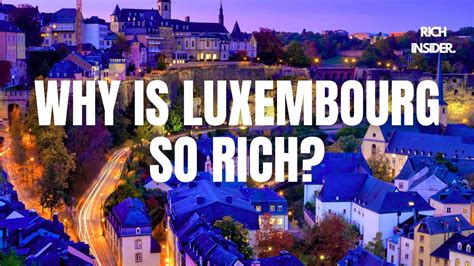Luxembourg, a small country located in the heart of Europe, has consistently ranked as one of the wealthiest nations in the world. With a GDP per capita of over $105,000, it surpasses many other developed countries, including the United States, Germany, and the United Kingdom. So, what makes Luxembourg so rich?
To understand the country’s prosperity, it’s essential to delve into its history, geography, and economic policies. Luxembourg’s strategic location, nestled between France, Germany, and Belgium, has played a significant role in its development. The country’s unique position has allowed it to serve as a bridge between European markets, facilitating trade and investment.
One of the primary factors contributing to Luxembourg’s wealth is its highly developed financial sector. The country has a long history of banking and finance, dating back to the 19th century. Today, Luxembourg is home to over 140 banks, including some of the world’s most prominent financial institutions, such as Banque et Caisse d’Épargne de l’État (BCEE) and Société Générale. The financial sector accounts for approximately 25% of the country’s GDP, making it a significant contributor to the economy.
Another key factor in Luxembourg’s prosperity is its industrial sector, particularly in the steel and chemical industries. The country has a long tradition of steel production, with companies like ArcelorMittal, and has also become a significant player in the chemical industry, with firms like DuPont and BASF operating in the country. The industrial sector accounts for around 15% of the country’s GDP, providing a stable source of revenue.
Luxembourg’s highly developed logistics and transportation infrastructure has also contributed to its wealth. The country’s strategic location, combined with its well-developed road, rail, and air networks, makes it an ideal hub for international trade and commerce. The Luxembourg Airport, for example, is a major cargo hub, serving as a gateway to European markets.
Key Factors Contributing to Luxembourg's Wealth
- Financial Sector: A highly developed banking and finance industry, with a strong regulatory framework and competitive tax regime.
- Industrial Sector: A significant steel and chemical industry, with major companies like ArcelorMittal and DuPont operating in the country.
- Logistics and Transportation: A well-developed infrastructure, including roads, railways, and airports, facilitating international trade and commerce.
- Highly Skilled Workforce: A highly educated and skilled workforce, with a strong focus on innovation and digitalization.
The country’s highly skilled workforce is another essential factor in its prosperity. Luxembourg has a strong education system, with a high percentage of the population holding tertiary qualifications. The country’s workforce is also highly multilingual, with many citizens speaking four or five languages, including English, French, German, and Luxembourgish. This linguistic diversity, combined with a strong work ethic and adaptability, makes Luxembourg’s workforce highly attractive to international companies.
Luxembourg’s commitment to innovation and digitalization has also been a driving force behind its economic success. The country has invested heavily in research and development, with a strong focus on emerging technologies like artificial intelligence, blockchain, and cybersecurity. This has created a thriving startup ecosystem, with many innovative companies, such as SnT (Interdisciplinary Centre for Security, Reliability and Trust), operating in the country.
Pros and Cons of Luxembourg's Economy
Pros:
- Highly developed financial sector
- Strong industrial sector
- Well-developed logistics and transportation infrastructure
- Highly skilled and multilingual workforce
Cons:
- Dependence on a few key industries
- Vulnerability to global economic trends
- High cost of living
- Limited natural resources
While Luxembourg’s economy is highly developed, it is not without its challenges. The country’s dependence on a few key industries, such as finance and steel, makes it vulnerable to global economic trends. Additionally, the high cost of living in Luxembourg can make it difficult for some residents to afford basic necessities. Despite these challenges, however, Luxembourg remains one of the wealthiest and most prosperous countries in the world, with a unique combination of factors contributing to its success.
What is the main contributor to Luxembourg's economy?
+The financial sector is the main contributor to Luxembourg's economy, accounting for approximately 25% of the country's GDP.
What is the average salary in Luxembourg?
+The average salary in Luxembourg is around €55,000 per year, making it one of the highest in the world.
What are the main industries in Luxembourg?
+The main industries in Luxembourg are finance, steel, and chemicals, with companies like ArcelorMittal and DuPont operating in the country.
In conclusion, Luxembourg’s wealth can be attributed to a combination of factors, including its highly developed financial sector, industrial sector, logistics and transportation infrastructure, and highly skilled workforce. While the country faces challenges, such as dependence on a few key industries and a high cost of living, its unique blend of strengths has made it one of the most prosperous countries in the world. As the global economy continues to evolve, Luxembourg is well-positioned to remain a leader in innovation and economic growth.

